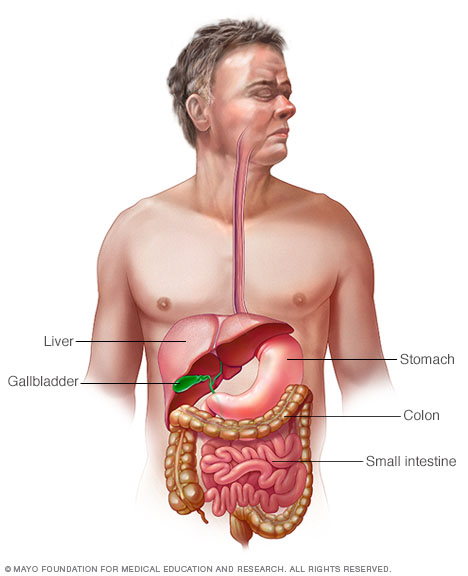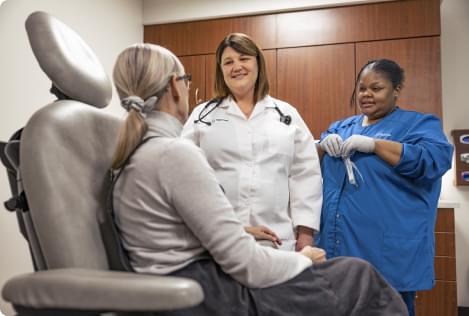Overview
Indigestion is discomfort or pain in the belly. Symptoms may include a burning pain, feeling full while eating or feeling full long after eating. Indigestion symptoms may happen once in a while or often.
Indigestion may be caused by a digestive system condition. But often, there is no clear underlying cause. Frequent or long-lasting indigestion often can be treated with changes in diet and lifestyle, mental health therapy, and medicines.
Indigestion also is called upset stomach or dyspepsia.

Symptoms
Symptoms of indigestion may include:
- Early fullness during a meal or not being able to finish a typical meal.
- Uncomfortable fullness that lasts longer than it should after a meal.
- Mild to severe pain in the upper abdomen, which is the area between the bottom of your breastbone and your belly button.
- Burning sensation in the upper abdomen.
- Bloating that feels like swelling or tightness in the upper abdomen.
- Feeling the need to vomit or vomiting.
- Burping or burping up food.
Sometimes people with indigestion also experience heartburn. Heartburn is a pain or burning feeling in the center of your chest during or after eating. The pain or burning feeling may radiate into your neck or back.
When to see a doctor
Mild indigestion usually is nothing to worry about. Talk with your healthcare professional if symptoms of indigestion last more than two weeks.
Get care as soon as possible if you have indigestion and these symptoms:
- Severe or constant belly pain.
- Unintended weight loss or loss of appetite.
- Repeated vomiting or vomiting with blood.
- Black, tarry stools.
- Trouble with swallowing.
- Fatigue or weakness.
- A yellowing of the skin or eyes, also called jaundice.
Get emergency care if you have indigestion-like symptoms that may be symptoms of a heart attack:
- Shortness of breath, sweating, or chest pain radiating to the jaw, neck or arm.
- Chest pain when you're active or stressed.
Causes
Indigestion usually has no clear underlying medical condition as a cause. Long-lasting or frequent indigestion with no clear underlying medical cause is called functional indigestion.
Many factors may contribute to or worsen functional indigestion. These include:
- Overeating or eating too quickly.
- Fatty, greasy or spicy foods.
- Caffeine, alcohol or carbonated beverages.
- Acidic foods, such as tomatoes and oranges.
- Anxiety, depression or trauma.
- Smoking.
- Certain antibiotics and pain relievers.
H. pylori bacteria can cause ulcers in the stomach or small intestine. H. pylori may contribute to indigestion even if it has not caused an ulcer.
Underlying causes
Several conditions can cause indigestion. Underlying causes vary among different age groups.
- Children
- H. pylori infection.
- Other infections of the digestive system.
- Conditions affecting how much food the stomach can hold or how it empties.
- Stress.
- Young adults
- H. pylori infection.
- Gastroesophageal reflux disease, also called GERD, when stomach acid regularly flows back up into the esophagus.
- Diet.
- Stress.
- Adults ages 40 to 60
- H. pylori infection.
- Ulcers of the stomach or small intestine.
- GERD.
- Pain medicines, such as aspirin, ibuprofen (Advil, Motrin IB, others) and naproxen sodium (Aleve).
- Adults over 60
- Ulcers of the stomach or small intestine.
- GERD.
- Stomach cancer.
- Pain medicines, such as aspirin, ibuprofen (Advil, Motrin IB, others) and naproxen sodium (Aleve).
Risk factors
Several factors can make it more likely for you to have symptoms even though they don't always cause indigestion:
- Eating too fast, overeating, or eating spicy, fatty, acidic or greasy foods.
- Too many alcoholic, caffeinated or carbonated drinks.
- Depression, anxiety or trauma.
- Smoking or using other tobacco products.
- Pregnancy-related hormones and pressure on the digestive system during pregnancy.
- Carrying extra weight, particularly around the belly.
Complications
Although indigestion doesn't usually have serious complications, it can affect your quality of life. You may eat less. You also might miss work or school because of your symptoms.
Diagnosis
To diagnose indigestion, your healthcare professional asks you about your symptoms, recent meals, eating habits, medical history, life stresses, exposure to anyone who's ill and other questions. Your answers help your health professional understand the possible factors linked to your symptoms.
You also have a thorough medical exam. This includes tapping or pressing on your abdomen and listening to your abdomen with a stethoscope.
Your healthcare professional may be able to diagnose functional indigestion based on your symptoms, medical history and exam.
H. pylori test
Your healthcare professional may order a test for H. pylori bacteria. This may be done with a tissue sample from the stomach, breath test or stool sample.
Other tests
Other tests may be needed if your healthcare professional is concerned about particular symptoms or findings from your exam. You also may need more tests if the first line of treatment for indigestion does not help with symptoms. These tests may include:
- Blood tests. Lab tests of blood samples may find signs of other conditions that can cause symptoms of indigestion.
- Endoscopy. An endoscope is a tube with a camera that passes down the throat and into the digestive system. This test is called endoscopy. It can show diseased or damaged tissue. Tools used during this test also can remove a tiny sample of tissue for lab testing. This test mainly is used for adults age 50 and older who have new symptoms of indigestion.
- Imaging tests can show diseased tissues, blockage in the digestive system or other irregular findings.
Treatment
A variety of treatments may improve symptoms of indigestion.
Diet and medicine changes
Changes to the diet and possible changes in medicines are the first steps in lessening symptoms. These include the following:
- Avoid fatty, acidic or spicy foods.
- Avoid caffeine, alcohol and carbonated beverages.
- Avoid pain medicines such as aspirin, ibuprofen (Advil, Motrin IB, others) and naproxen sodium (Aleve).
- Ask your healthcare professional if any of your prescription medicines may be contributing to indigestion. Ask if there are alternatives.
- Review your use of dietary supplements or herbal remedies with your healthcare professional to see if there is anything that may be contributing to your symptoms.
Mental healthcare
Talk therapy with a psychotherapist can help you manage depression, anxiety and related factors that may be contributing to indigestion. Prescription medicines also may help lessen symptoms of depression and anxiety.
Medicines for the digestive system
Your healthcare professional may prescribe medicines or recommend medicines you can buy without a prescription to lessen indigestion symptoms. These may include:
- Antibiotics. If you tested positive for H. pylori bacteria, a treatment with antibiotics and acid-reduction medicines may lessen symptoms.
- Proton pump inhibitors, also called PPIs, which reduce the production of acids in the stomach. These medicines are available in prescription and over-the-counter doses. PPIs you can buy without a prescription include lansoprazole (Prevacid 24 HR), omeprazole (Prilosec OTC) and esomeprazole (Nexium 24HR).
- H-2-receptor blockers, which also reduce acid production, are available in prescription and nonprescription doses. H-2-receptor blockers you can buy without a prescription include cimetidine (Tagamet HB), famotidine (Pepcid AC) and nizatidine (Axid AR).
- Prokinetics. These prescription medicines help the stomach empty faster and tighten the valve between the stomach and esophagus.
Lifestyle and home remedies
Lifestyle changes that can be part of your routine may help lessen symptoms or prevent the return of symptoms:
- Avoid fatty, acidic or spicy foods. Avoid caffeine, alcohol and carbonated beverages.
- Eat five or six small meals a day instead of three large meals.
- Avoid pain medicines such as aspirin, ibuprofen (Advil, Motrin IB, others) and naproxen sodium (Aleve).
- Exercise regularly and maintain a healthy weight.
- Stop smoking if you smoke.
- Avoid stressors when possible.
- Practice meditation or other mindfulness exercises to help manage stress.
Alternative medicine
Alternative and complementary treatments that may improve symptoms of indigestion include:
- Peppermint oil or a combination of peppermint and caraway oils.
- A Japanese herbal formula called rikkunshito.
- Acupuncture.
- Yoga and mindfulness practices.
Check with your healthcare professional before you take any supplements. Your health professional can help make sure the dose is safe for you. It's also important to make sure the supplement won't react with any other medicines you take.
Preparing for an appointment
You're likely to start by seeing your primary healthcare professional. You may be referred to a doctor who specializes in digestive diseases, called a gastroenterologist. Here's some information to help you get ready for your appointment and know what to expect.
What you can do
- Be aware of any restrictions before your appointment, such as not eating solid food before your appointment.
- Write down your symptoms, including when they started and how they may have changed or worsened over time.
- Make a list of all your medicines, vitamins or supplements and the doses and reasons for taking each one.
- Write down your key medical information, including other diagnosed conditions.
- Write down key personal information, including any recent changes or stressors in your life. Also, include a detailed description of your typical daily diet.
- Write down questions to ask during your appointment.
Some basic questions you may wish to ask include:
- Do you think my condition is temporary or chronic?
- What kinds of tests do I need?
- What treatments can help?
- Are there any dietary restrictions that I need to follow?
- Could any of my medicines be causing my symptoms?
In addition to the questions that you've prepared, don't hesitate to ask other questions during your appointment.
What to expect from your doctor
Be ready to answer questions your healthcare professional may ask, such as:
- When did your symptoms begin?
- How would you describe the pain? How would you rate it on a scale of 1 to 10?
- How often do you have symptoms? Are they constant?
- Does anything worsen symptoms? Does anything help them?
- How would you describe your diet? How may fruits and vegetables do you eat?
- How much alcohol and caffeine do you have on a typical day?
- Are you feeling depressed or anxious?
- Have you experienced any recent major stressor or life change?
- Do you use tobacco? What kind?
- Are your symptoms better or worse on an empty stomach?
- Have you vomited blood or black material?
- Have you had any changes in your bowel habits, including stools turning black?
- Have you lost weight?
- Have you felt like vomiting or vomited?
© 1998-2026 Mayo Foundation for Medical Education and Research (MFMER). All rights reserved. Terms of Use


